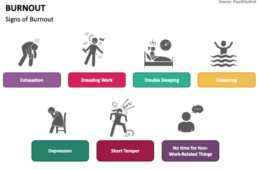Managing Burnout in the Workplace | Are Your Leaders Fully Equipped to Face It?
In today’s fast-paced world, managing burnout in the workplace is a priority. The demand on our time has increased significantly, meaning practical strategies to mitigate this have become ever more important.
From work to family responsibilities, we’re constantly juggling multiple tasks at once. A recent chart created by Our World in Data highlights how Americans spend their time by age. Beyond mere statistics, this chart has significant real-world implications for managers and leaders, especially those in the 40% who attain their first managerial position between the ages of 25 and 30.
Have you heard about "Mattering"
Rethinking the Link between Well-being, Productivity, and "Mattering".
After reading the article about “Mattering” published by the World Economic Forum following this year's event and the response from Jemima Kelly from the Financial Times, I have a lot of questions and thoughts that have come up. Whilst I do believe the objective of making sure every individual feels valued in their job, I am still questioning the causal relations between, Wellbeing, Productivity, and “Mattering”.
How to Successfully Manage Employee Burnout
It’s easy to get caught up in the day-to-day operations of a business and miss possible underlying issues. One such potential problem that can have a major impact on your organisation is employee burnout.
Read more
7 Ways You Can Improve Your Company Culture | Impactful Ideas for Individuals
Following recent articles from Forbes, The Times, and BBC News on the topic, it’s clearly time for businesses to consider new ideas to improve their company culture.
As a response to the additional difficulties presented by remote work and the transition back to working in an office environment, companies are investing significant amounts of money in developing their company culture. While these efforts are both commendable and necessary, it’s important to remember that every individual employee has a role to play in creating and maintaining a positive work culture.
What Is Company Culture?
The culture of a business isn’t something that can be easily defined or changed.
It’s the sum of every employee’s behaviours, actions, and attitudes, which create a shared sense of identity and values within an organisation. Each individual contributes to the overall culture through their interactions with colleagues, work habits, and communication styles.
For example, if employees consistently demonstrate high levels of professionalism, respect, and collaboration, the culture of their company will likely reflect those values.
On the other hand, if employees engage in negative behaviours such as gossiping, withholding information, or refusing to work as a team, the culture of their organisation will likely become toxic and unsupportive.
Of course, it’s important to note that culture is not created in a vacuum. External factors such as industry trends, social norms, and the competitive landscape can also have an influence. However, the behaviours and attitudes of employees remain a critical component in shaping and improving company culture.
How to Improve Company Culture
The purpose of this article is to explore the concept of corporate culture, as well as the importance of individual responsibility in creating a positive working environment.
Remember what John F. Kennedy once said:
“Ask not what your country can do for you; ask what you can do for your country.”
Ultimately, our aim is to inspire readers to become actors of change in their own workplaces, thus creating a better culture for both themselves and their colleagues.
Creating a virtuous cycle of interactions - based on what some might consider old-fashioned ideas! - can have a profound impact on the culture of a business. The collective behaviours of every individual in an organisation contribute to the creation of its true culture, which in turn is reflected in how the outside world perceives it.
Here Are 7 Ways You Can Improve Your Company Culture:
- Assume positive intent: Assume that your colleagues, team, or boss have good intentions, even if you don’t always agree with them. This will create a more positive working environment.
- Rediscover the true meaning of commitment: When you give your word that you will do something, focus on delivering on time, every time. Building trust through consistent delivery is key to creating a supportive workplace.
- Engage in meetings: Be focused and prepared for meetings. Engage actively and contribute constructively to encourage productivity.
- Develop a can-do attitude: Ensure that you understand what you are supposed to do and when by asking clarifying questions where necessary. Take ownership of your responsibilities and strive to achieve them to the best of your ability.
- Don’t set others up for failure: Support your colleagues by sharing information and resources. Work collaboratively to achieve shared goals.
- Respect others’ time and space: Be mindful of your colleagues’ schedules and avoid wasting their time. When you respect their boundaries and space, they will often return the favour
- Anticipate and adapt: Be flexible and adaptable to changing circumstances. Anticipate potential challenges and be proactive in finding solutions.
These behaviours contribute to the collective good and are essential for improving individual well-being and productivity. By facilitating a culture of respect and trust, businesses can foster a nurturing and sustainable working environment, thereby improving their company culture.
For more information about how Avilio could help you and/or your organisation, please don’t hesitate to reach out to our founder, Philippe.
Alternatively, why not read our guide on understanding the signs of employee burnout?
Navigating organisational change: the importance of Time Management skills for managers
Time management skills are crucial in today's fast-paced business environment, where workload fluctuations are inevitable and can significantly impact employees, particularly managers. Whether it's a struggle to recruit, job redundancies, or a reorganisation plan underway, the surge in workload can quickly become overwhelming. This is where solid time management skills become indispensable, enabling individuals to prepare mentally and effectively better handle the increased demands.Read more
Beware Of "Others" When Managing Your Time
Managing your time – The paradox of planning: why time management is not enough without Collaboration. When Philosophy and Poetry shape time management.
The (not so) Surprising Impact of Time Management on Sales Performance
Over the past few months, I have had the opportunity to talk to various sales organisations in the UK and France. As we were discussing training requirements for #salespeople and sales managers, it became evident that effective time management skills are essential for enhancing sales performance.
In the UK, a survey conducted by PwC revealed that 56% of salespeople are not effectively managing their time, leading to decreased productivity, sales performance and lost opportunities. Similarly, a study by Cegos found that 61% of salespeople in France felt that they were not provided with adequate training on time management skills.
These statistics highlight the need for companies to include time management training as an integral part of their sales training programmes to improve the overall productivity and efficiency of their sales force. However, it is surprising to note that most training programmes specifically designed for sales personnel do not include #timemanagement skills.
But what are the key benefits of focusing on improving time management for sales organisations?
Let’s start with the most obvious one… Sales Performance = More revenue.
It is a numbers game…according to a study by HubSpot, salespeople who were able to manage their time effectively spent 34% more time selling, leading to a 15% increase in sales performance and productivity. When salespeople are more productive, they can have more conversations and meetings, leading to more sales opportunities and revenue generation.
But the benefits of time management skills extend beyond just increasing the number of interactions.
By understanding and implementing key principles of time management, salespeople can become better at the "selling" part of their job.
They can allocate more time to prepare for each meeting, allowing them to be more focused and engaged during client interactions. This increased focus can help salespeople better understand client needs and preferences, allowing them to more effectively tailor their approach and offerings which in turn improve their conversion rates.
A survey conducted by Sales Hacker found that sales teams that prioritised time management had a win rate of 43%, compared to just 34% for teams that did not.
Second…Better customer satisfaction
Incorporating debriefing time into salespeople's schedules can also have a positive impact on customer satisfaction and sales performance.
By having the time to review each interaction, salespeople can identify areas where they can improve and adjust their approach to better meet customer needs. This helps to build stronger, more trusting relationships with clients over time.
By scheduling time to reflect on meetings, salespeople can ensure faster responses to clients' enquiries and demonstrate their commitment to follow-up actions. Research by Harvard Business Review has shown that customers who receive a rapid response to their enquiries are more likely to become repeat customers, and that repeat customers spend on average 67% more than new customers.
Third…Better forecasting
Effective time management skills play a crucial role in enabling sales organisations to improve their forecasting accuracy.
Salespeople and sales managers need to have a deep understanding of when sales are likely to close, and this requires effective planning and communication.
By developing their time management skills, salespeople can better articulate the next steps in the sales process, providing evidence-based information that can be used to build confidence in sales forecasts. In turn, this can help sales organisations put in place the necessary measures to achieve their targets, driving growth and success over the long term.
Accurate forecasting is a key priority for high-performing sales teams, with 57% citing it as such according to research by Salesforce. By prioritising time management and improving their ability to accurately forecast sales, salespeople and sales managers can make better-informed decisions about resource allocation, drive revenue growth, and ultimately achieve greater success in their roles.
The same survey found that teams with accurate sales forecasts have 10% higher win rates than teams with poor forecasts.
Fourth… Better job satisfaction
“You are only as good as your last month”…For salespeople, this means that every month, they start anew with a fresh set of targets and challenges to tackle to achieve them. It is a huge pressure and urgency that salespeople face every week, every month, or every year to meet their quotas and generate revenue. Salespeople can sometimes find themselves in a position of not knowing where their revenue will come from, when they will have important meetings with their clients, or when their project will be delivered by the service team.
These uncertainties can lead to increased levels of stress and anxiety, making it difficult to improve their sales performance.
Effective time management techniques can help salespeople regain control of their schedule and alleviate some of this stress, ultimately leading to better sales performance and increased job satisfaction.
Effective time management techniques can provide salespeople with a greater sense of control over their workload and sales pipeline. With better control comes greater confidence in the ability to meet targets and the capacity to put in place the necessary actions to achieve them.
By mastering these techniques, salespeople can reduce stress and increase productivity, leading to improved job satisfaction and higher revenue for the organisation.
Finally…a special mention for Sales Managers who carry their own sales quota.
According to a study by CSO Insights, 62% of #salesmanagers in the UK carry their own sales quota in addition to managing their team's quotas. This puts them in a challenging position, as they must balance the responsibilities of both selling and leading a team.
Effective time management becomes even more critical for sales managers with personal quotas, as they must prioritise their time between their own sales activities and coaching and supporting their team.
Without effective time management techniques, they may struggle to meet their individual targets and effectively guide their team toward success and higher sales performance.
In conclusion, yes, it's essential to have effective sales management tools and training in place to drive success and sales performance.
However, simply investing in these resources and forgetting to equip your sales team with strong time management and collaboration skills is not enough to achieve success. Sales managers and salespeople need to understand how being able to manage their time effectively is critical in driving results.
Unlocking Personae Productivity
Managers are an essential part of organisations, responsible for leading teams, making critical decisions, and driving initiatives. They are critical to getting the job done. But did you know that managers are more likely to be in a relationship, have children, and own a home compared to the general population? In this article, I'll explore how the profile of managers impacts their well-being and productivity and how “Personae Productivity” can help them.
Let’s start with the Relationship Status
According to data from the U.S. Bureau of Labor Statistics (BLS), as of 2020, 62% of managers were married. This percentage is higher than the overall percentage of married adults in the U.S., which was 50.5% in 2019 according to the U.S. Census Bureau.
Interestingly, the percentage of married managers varies depending on the industry. For example, in the healthcare and social assistance industry, 71% of managers were married, while in the accommodation and food services industry, only 52% of managers were married. The survey conducted by BetterHelp in 2020 found that a majority of respondents reported that relationship issues were a significant source of stress in their lives. Specifically, 60% of the 2,000 respondents indicated that their relationships were causing stress. This was the second most commonly reported source of stress, following work-related stress.
What about Children?
The BLS data also provides insights into the percentage of managers with children. As of 2020, 58% of managers had children under the age of 18. This percentage is also higher than the overall percentage of adults with children under 18, which was 48.2% in 2019 according to the U.S. Census Bureau. Like marital status, the percentage of managers with children varies depending on the industry. In the education services industry, 69% of managers had children under 18, while in the information industry, only 44% of managers had children under 18. A study by the American Psychological Association found that 75% of parents reported experiencing moderate to high levels of stress in the past month, compared to 63% of individuals without children.
Finally, Homeownership.
A 2020 survey by LinkedIn found that 74% of managers own a home. Of those who do not currently own a home, 45% said they plan to buy within the next five years. The LinkedIn survey also found that among managers who do own a home, the majority (62%) have a mortgage, while 23% own their home outright and 15% are renting their home.
Again, homeownership rates among managers vary depending on the industry. In the finance and insurance industry, 83% of managers own a home, while in the retail industry, only 62% of managers own a home. A survey by the National Association of Home Builders found that 81% of home buyers reported that the process of finding and buying a home was stressful and LendingTree found that 67% of homeowners said that they experienced stress related to home maintenance and repairs. And the study published in 1994, by the Journal of Family and Economic Issues found that mortgage debt was significantly related to psychological distress among homeowners.
In summary, managers who tend to be in a relationship, have children and own a home at higher rates than the general population, cumulate many critical work and life stressors.
Personal life stressors such as relationship requirements, financial commitments, and family logistics require a lot of time and energy for one to deal with and certainly add to the pressure already experienced at work. According to a survey conducted by the American Psychological Association, 61% of workers reported that workplace stress had a negative impact on their personal lives, and 39% said that personal stress had a negative impact on their work performance. These statistics highlight the significant impact that personal life stressors can have on employees' well-being and job performance, including contributing to burnout.
Unfortunately, many managers don't feel comfortable discussing their stress with their supervisors. The Journal of Occupational Health Psychology examined the relationship between managerial status and disclosure of mental health symptoms to supervisors. Specifically, managers were less likely to disclose symptoms of depression, anxiety, and stress, and were less likely to seek help for these symptoms. The study also found that fear of negative consequences, such as being stigmatized or being seen as weak or incompetent, was a significant barrier to disclosure for both managers and non-managerial employees.
The statistics are clear. Managers will more likely than not experience stress and anxiety, by the simple fact that they cumulate all the main “stressors”. Deloitte's study revealed that 77% of managers have experienced “burnout” in their job.
Introducing “Personae Productivity”.
"Personae," is used to refer to the different roles, characters, or identities that a person will assume: such as a parent, an employee, a friend, and a football or opera fanatic, each with its own set of behaviors, attitudes, requirements, and expectations.
What do I mean by “productivity” in that context? The basic definition is to get more output from every hour available or in other words to be able to do more in a lesser amount of time.
Now, the concept of productivity has been totally hijacked by the business world and has become almost toxic in the private sphere, when in fact it could/ should apply to all aspects of life.
Personae Productivity is about more work and more conversations. But Personae Productivity also means more gym time, more romantic dinners with your partner, more time for yourself, more time with the kids, and more activities with your friends...With one simple objective: to be the best of who you are and who you want to be.
In conclusion, understanding that managers have unique characteristics is crucial for improving their productivity and overall well-being. The concept of "Personae Productivity" highlights the importance of balancing work and personal life to achieve the best version of oneself. By taking into account these factors, organisations can better support their managers, leading to increased productivity, reduced burnout, and improved job satisfaction. It is important to recognise that productivity should not be limited to the workplace but should apply to all aspects of life.
Five telltale signs your work life is affecting your personal life
Do you remember the thrill of receiving the job offer you were so eager for and the excitement of starting at a new company? Work life balance in those early days is not a factor. But weeks, months, and years into a role, lots of us still relish the challenges and enjoy our jobs, but there can be times when it feels like the work life balance is non-existent and work is seeping into the corners of our home life and our brains can’t switch off.
Happiness at work has a huge impact on happiness outside of work, but often it’s not until we’re facing burnout that we realise our work life balance is having a detrimental effect on our home life. Read up on the five telltale signs here:
1. Disturbed sleep and insomnia
Sleep is crucial for humans to reset our minds and re-energise our bodies and brains. If your usual sleep patterns start to be interrupted by nagging thoughts of work or if bouts of insomnia strike, this is a big warning sign that something is out of kilter.
2. Our families see a change
The people we share our homes with are those who notice when we aren’t behaving like ourselves. When our moods are changing and we are less engaged with home life, it’s a clue that our work life is knocking on our front door after hours and upsetting our downtime.
3. Zero energy for hobbies – work life balance is a no!
Our inclination to head out and exercise, or meet up with our regular groups might suddenly drop off a cliff, and be replaced with a feeling of not wanting to do anything. Our motivation to pursue our enjoyment is depleted either because our brains are stewing over work and can’t switch off, or our energy levels are drained from burnout.
4. Lack of motivation at work
The role that you have given your all to now feels like something you don’t want to be doing. Completing tasks feels like a slog and your focus has gone from laser-sharp to blurry. When your productivity at work is noticeably low, your whole performance starts to suffer and resetting can be tricky.
5. Work and personal goals are left in the dust
You were set to apply for a promotion and had carved out time on your weekends to train for a half marathon, but these plans have been quietly shelved - in fact, it’s a struggle to even think about goals. Not managing time well and missing out on opportunities creates a negative cycle, which can be tough to override.
Here to help you
Work inevitably takes up a chunk of our headspace, but it shouldn’t be setting up permanent camp in our brains when we’re outside of work and making us worry or feel utterly exhausted. At Avilio we are specialists in increasing productivity and happiness in the workplace, leading to happier lives outside of work. Our unique programmes give you techniques and strategies for life to say productive, motivated, and happy.
Talk to us today about how we can make this happen for you and your organisation.
Still looking for more information? Read the Harvard Business Review article on the Work Life Balance being a cycle and not an achievement. The article looks at the work-life balance not being an achievement, but a continuous process, as per research by Ioana Lupu and Mayra Ruiz-Castro.
They conducted nearly 200 interviews with professionals and found that achieving a sustainable balance between work and personal life requires reflexivity and role redefinition. The process is a cycle of five steps: pause and denormalise, pay attention to emotions, reprioritize, consider alternatives, and implement changes.
This isn't a one-time event but a continuous engagement to accommodate changing circumstances and priorities.
Stop missing deadlines! A guide for project managers, software developers, and freelancers
Deadlines: familiar, unavoidable, and yet missed as frequently as a bus. How many have you missed in the last year? Even when they are pushed back and eventually completed, the knock-on effect is already in motion. The simple sum in business is this: Missing deadlines affect productivity. Productivity equals profitability, and each deadline that gets missed has a ripple effect directly down to the bottom line of the business. Whether you’re working for a small or large company or you’re freelancing, missing a deadline impacts profitability, morale, and reputation.









